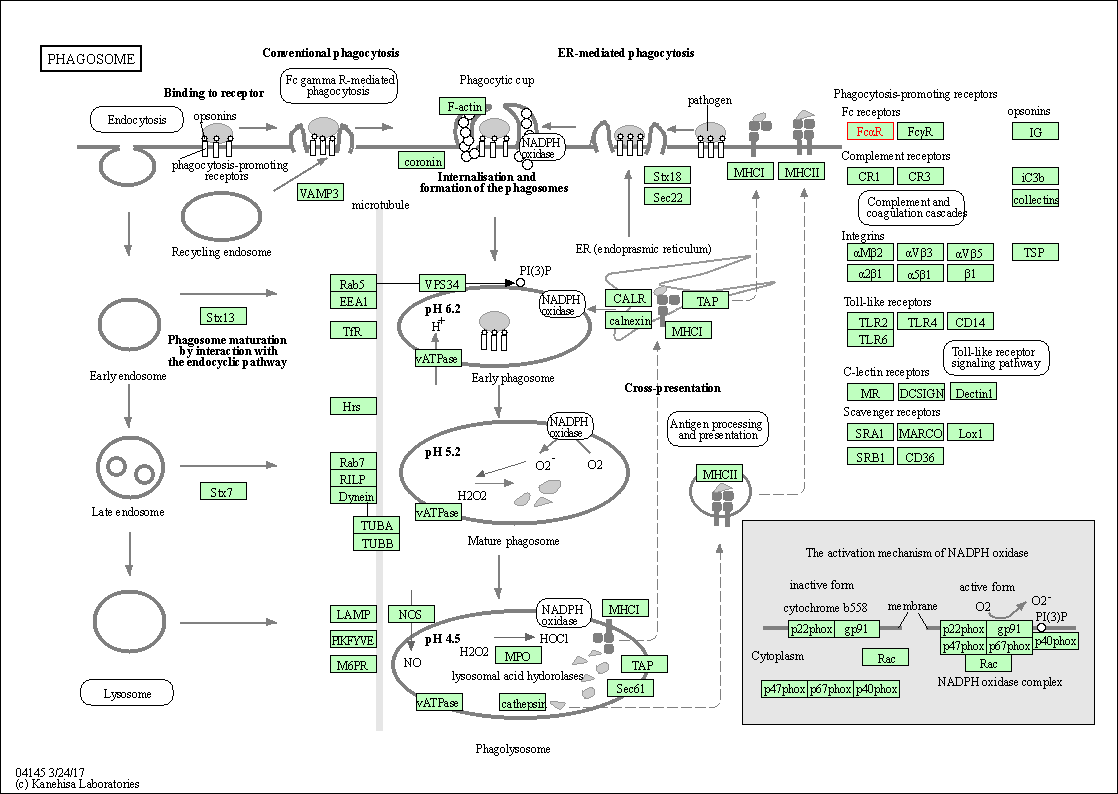Target Information
| Target General Information | Top | |||||
|---|---|---|---|---|---|---|
| Target ID |
T45737
(Former ID: TTDR00310)
|
|||||
| Target Name |
Immunoglobulin alpha Fc receptor (FCAR)
|
|||||
| Synonyms |
IgA Fc receptor; FCAR; CD89 antigen; CD89
Click to Show/Hide
|
|||||
| Gene Name |
FCAR
|
|||||
| Target Type |
Discontinued target
|
[1] | ||||
| Disease | [+] 1 Target-related Diseases | + | ||||
| 1 | Diabetes mellitus [ICD-11: 5A10] | |||||
| Function |
Binds to the fc region of immunoglobulins alpha. Mediates several functions including cytokine production.
Click to Show/Hide
|
|||||
| UniProt ID | ||||||
| Sequence |
MDPKQTTLLCLVLCLGQRIQAQEGDFPMPFISAKSSPVIPLDGSVKIQCQAIREAYLTQL
MIIKNSTYREIGRRLKFWNETDPEFVIDHMDANKAGRYQCQYRIGHYRFRYSDTLELVVT GLYGKPFLSADRGLVLMPGENISLTCSSAHIPFDRFSLAKEGELSLPQHQSGEHPANFSL GPVDLNVSGIYRCYGWYNRSPYLWSFPSNALELVVTDSIHQDYTTQNLIRMAVAGLVLVA LLAILVENWHSHTALNKEASADVAEPSWSQQMCQPGLTFARTPSVCK Click to Show/Hide
|
|||||
| 3D Structure | Click to Show 3D Structure of This Target | AlphaFold | ||||
| Drugs and Modes of Action | Top | |||||
|---|---|---|---|---|---|---|
| Discontinued Drug(s) | [+] 1 Discontinued Drugs | + | ||||
| 1 | MDX-214 | Drug Info | Discontinued in Phase 1/2 | Autoimmune diabetes | [2] | |
| Cell-based Target Expression Variations | Top | |||||
|---|---|---|---|---|---|---|
| Cell-based Target Expression Variations | ||||||
| Different Human System Profiles of Target | Top |
|---|---|
|
Human Similarity Proteins
of target is determined by comparing the sequence similarity of all human proteins with the target based on BLAST. The similarity proteins for a target are defined as the proteins with E-value < 0.005 and outside the protein families of the target.
A target that has fewer human similarity proteins outside its family is commonly regarded to possess a greater capacity to avoid undesired interactions and thus increase the possibility of finding successful drugs
(Brief Bioinform, 21: 649-662, 2020).
Human Tissue Distribution
of target is determined from a proteomics study that quantified more than 12,000 genes across 32 normal human tissues. Tissue Specificity (TS) score was used to define the enrichment of target across tissues.
The distribution of targets among different tissues or organs need to be taken into consideration when assessing the target druggability, as it is generally accepted that the wider the target distribution, the greater the concern over potential adverse effects
(Nat Rev Drug Discov, 20: 64-81, 2021).
Human Pathway Affiliation
of target is determined by the life-essential pathways provided on KEGG database. The target-affiliated pathways were defined based on the following two criteria (a) the pathways of the studied target should be life-essential for both healthy individuals and patients, and (b) the studied target should occupy an upstream position in the pathways and therefore had the ability to regulate biological function.
Targets involved in a fewer pathways have greater likelihood to be successfully developed, while those associated with more human pathways increase the chance of undesirable interferences with other human processes
(Pharmacol Rev, 58: 259-279, 2006).
Human Similarity Proteins
Human Tissue Distribution
Human Pathway Affiliation
|
|
|
Note:
If a protein has TS (tissue specficity) scores at least in one tissue >= 2.5, this protein is called tissue-enriched (including tissue-enriched-but-not-specific and tissue-specific). In the plots, the vertical lines are at thresholds 2.5 and 4.
|
| KEGG Pathway | Pathway ID | Affiliated Target | Pathway Map |
|---|---|---|---|
| Phagosome | hsa04145 | Affiliated Target |

|
| Class: Cellular Processes => Transport and catabolism | Pathway Hierarchy | ||
| Target Affiliated Biological Pathways | Top | |||||
|---|---|---|---|---|---|---|
| KEGG Pathway | [+] 2 KEGG Pathways | + | ||||
| 1 | Phagosome | |||||
| 2 | Staphylococcus aureus infection | |||||
| References | Top | |||||
|---|---|---|---|---|---|---|
| REF 1 | A phase I, pharmacokinetic (PK) and pharmacodynamic (PD) study of MDX-214, a novel immune-mediated mechanism agent targeting the epithelial growth factor receptor (EGFR), in patients with advanced solid tumors. Journal of Clinical Oncology, Vol 24, No 18S (June 20 Supplement), 2006: 2523. | |||||
| REF 2 | Trusted, scientifically sound profiles of drug programs, clinical trials, safety reports, and company deals, written by scientists. Springer. 2015. Adis Insight (drug id 800019614) | |||||
If You Find Any Error in Data or Bug in Web Service, Please Kindly Report It to Dr. Zhou and Dr. Zhang.

